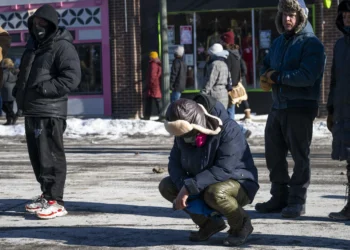Inside the Surveillance Tech Fueling Trump’s Deportation Machine
In recent years, the issue of immigration has become a hot topic in the United States. With the election of President Donald Trump, the debate has only intensified, with his administration implementing strict policies and ramping up efforts to deport undocumented immigrants. But what many people may not realize is the role that surveillance technology plays in this process.
Under the guise of national security and border control, the Trump administration has been using advanced surveillance technology to track and target not only undocumented immigrants, but also student protesters and other activists. This has raised serious concerns about privacy and civil liberties, as well as the impact it has on vulnerable communities.
One of the main tools being used by the Trump administration is the Automated Targeting System (ATS), a database that collects and analyzes personal information of individuals entering and exiting the country. This includes data from passports, visas, and other travel documents, as well as information from social media and other online sources.
The ATS was originally created after the 9/11 attacks to identify potential terrorists and criminals, but it has since been expanded to include a wide range of individuals, including immigrants. This means that anyone who has ever applied for a visa or traveled internationally could potentially be flagged and targeted for surveillance.
But it’s not just the ATS that is being used to track immigrants. The Department of Homeland Security (DHS) has also been using facial recognition technology at airports and other ports of entry to identify and track individuals. This technology has been criticized for its high error rates, particularly for people of color, and its potential for abuse.
In addition to these surveillance methods, the Trump administration has also been using social media monitoring to track and target immigrants. This involves collecting and analyzing data from social media platforms to identify potential threats and gather information on individuals. This has raised concerns about privacy and the potential for discrimination, as well as the chilling effect it may have on free speech and activism.
But it’s not just immigrants who are being targeted by these surveillance technologies. Student protesters and other activists have also been caught in the crosshairs. In 2018, it was revealed that the DHS had been monitoring social media activity of individuals involved in the migrant caravan protests, including tracking their locations and sharing this information with other government agencies.
This has had a chilling effect on the right to protest and has raised concerns about the government’s use of surveillance to suppress dissent. It also highlights the potential for these technologies to be used against any group or individual deemed a threat by the government.
The impact of these surveillance technologies goes beyond just privacy and civil liberties. It also has a devastating effect on immigrant communities, who already face discrimination and fear of deportation. The use of these technologies only adds to their vulnerability and creates a climate of fear and mistrust.
But there is hope. Activists and organizations have been fighting back against these surveillance methods, challenging their legality and advocating for stronger privacy protections. In 2019, a coalition of civil rights groups filed a lawsuit against the DHS, challenging the use of facial recognition technology at airports.
In addition, lawmakers have also introduced legislation to limit the use of these technologies and increase transparency and accountability. The Protecting Data at the Border Act, introduced by Senator Ron Wyden, would require the DHS to obtain a warrant before searching electronic devices at the border and limit the collection of sensitive information.
It’s clear that the use of surveillance technology by the Trump administration is a violation of privacy and civil liberties, and it has a disproportionate impact on marginalized communities. It’s important for us to continue to push back against these tactics and demand stronger protections for our rights.
As the debate on immigration continues, it’s crucial to remember the human impact of these policies and the role that surveillance technology plays in perpetuating them. We must stand in solidarity with immigrant communities and demand an end to these unjust and discriminatory practices.
In the words of The Intercept, “How Student Protesters and Immigrants Became Targets of Trump’s Surveillance Tech,” it’s time for us to take a stand and fight for a more just and equitable society for all. Let’s not let fear and discrimination dictate our policies and actions. Let’s work towards a future where everyone’s rights and dignity are respected and protected.






